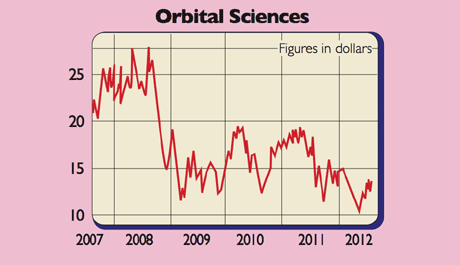Space: crossing the final frontier
It's been 40 years since man first landed on the moon. Now, Richard Branson and other buccaneers are paving the way for space tourism. Simon Wilson investigates whether it is yet a reality, and what the future holds for space exploration.
Get the latest financial news, insights and expert analysis from our award-winning MoneyWeek team, to help you understand what really matters when it comes to your finances.
You are now subscribed
Your newsletter sign-up was successful
Want to add more newsletters?

Twice daily
MoneyWeek
Get the latest financial news, insights and expert analysis from our award-winning MoneyWeek team, to help you understand what really matters when it comes to your finances.

Four times a week
Look After My Bills
Sign up to our free money-saving newsletter, filled with the latest news and expert advice to help you find the best tips and deals for managing your bills. Start saving today!
Is space tourism a reality?
Not yet. But the sceptics who dismissed Richard Branson and similar buccaneers with plans for mass space tourism may soon have to eat their words. Earlier this month Virgin Galactic unveiled its first commercial passenger spaceship at a ceremony in California's Mojave desert. The sleek, black and white 18-metre long vessel is capable of taking six passengers and two pilots for a brief trip into space. Virgin has already taken $4m in deposits from 300 paying customers (a ticket costs $200,000). If all goes to plan, the Virgin Space Ship VSS Enterprise will be flying commercially within two years. After blasting up high enough to achieve weightlessness, and see the curvature of the Earth against the backdrop of space, passengers will glide back down to Earth. Flights will take off from New Mexico, with Sweden and Abu Dhabi to follow.
Is this just about tourism?
Far from it. The Virgin Galactic business model assumes that payloads of metal and silicone will be just as profitable as human cargo. As well as taking wealthy passengers to the edge of space, the Virgin mother ship (the large spacecraft that carries the smaller rocket plane to about 15km before boosting it a further 95km into space) will also be capable of using ground-launched rockets to fire small scientific and commercial satellites into orbital space at a fraction of Nasa's cost for such missions. Currently, Virgin says its commercial satellite-launching service will be available from 2014 for less than $3m, about one tenth of what it costs now.
The firm's chief, Will Whitehorn, says the Virgin craft could even be adapted to take crew members on behalf of Nasa or other nation's space agencies to the International Space Station (ISS) at a cost of less than $1.5m. As such, Virgin is just one of several firms looking to break the traditional Lockheed/Boeing near-duopoly and play a role in a more diverse model in which a greater range of private firms supply more services to Nasa. These days, the US national space agency is seen by critics as something of a lumbering giant and was described by President Obama this year as suffering from a sense of drift.
MoneyWeek
Subscribe to MoneyWeek today and get your first six magazine issues absolutely FREE

Sign up to Money Morning
Don't miss the latest investment and personal finances news, market analysis, plus money-saving tips with our free twice-daily newsletter
Don't miss the latest investment and personal finances news, market analysis, plus money-saving tips with our free twice-daily newsletter
What's Nasa's problem?
Between 2010, when the existing space shuttle makes its last flight, and 2015, when the new Orion crew capsule is supposed (perhaps optimistically) to enter service, Nasa will have no way of sending astronauts to the ISS, other than relying wholly on the Russians. For private firms, that creates a gap in the market. Along with Virgin, two other US-based companies are making significant steps towards filling it. Orbital Sciences has signed a $1.9bn contract to resupply the ISS with its Taurus II cargo rocket, and is currently building the launch facility. And Space Exploration Technologies (SpaceX) is working on a system similar to Virgin's, designed to carry people as well as cargo.
Which countries lead the space race?
The last great international space race in effect ended in 1969 when the United States beat the Soviet Union to put a man on the moon. The next great lunar race looks like being between the emerging Asian powers. An Indian lunar orbiter, the Chanrayaan-1, was one of three spacecraft responsible for the data collection that led to the discovery of water on the moon this year. China plans to land a spacecraft on the moon in 2012, with India launching another mission in 2013. And Japan is also in the mix; it launched its own moon orbiter two years ago. Other countries with space ambitions include Saudi Arabia, which is investing heavily in space technology, and the UAE. Abu Dhabi invested $280m in Virgin Galactic this summer, while the tiny emirate of Ras al-Khaimah plans to build a $265m spaceport with Space Adventures, the US company which took the first space tourist, Dennis Tito, to the International Space Station in 2001.
Where does that leave America?
Longer term, Nasa's Constellation project is still officially committed to sending men back to the moon, but this is subject to an ongoing policy debate over whether the costs (an estimated $119bn to reach the moon, compared to Nasa's annual budget of $18bn) and benefits stack up. The recent Augustine report on the future of US space exploration sets out a flexible programme that might involve visiting asteroids or other parts of the solar system too.
That said, the discovery this year of water and hydroxyl (one hydrogen molecule shy of being water) on the moon's surface has boosted the argument that the moon could be used as a staging post and filling station for missions further afield. China, Russia and Japan all say they plan to send manned missions within the next 20 years, with the aim of creating permanent bases.
Is Mars still a priority?
As scientists have discovered more about it, thanks to the handful of robot probes sent there since 1976, they have realised that Mars is the planet in our solar system most likely to be capable of supporting a human colony. Its surface may be rather more hospitable than the moon's. It's extremely cold average temperatures are around 55C but, crucially, it does have water ice at its poles. For that reason, exploration of the red planet is the long-term aim of both Nasa (by 2037, it says) and the European Space Agency (ESA). This year the ESA conducted a 105-day simulation exercise, and is currently recruiting for a full 520-day simulated mission.
Get the latest financial news, insights and expert analysis from our award-winning MoneyWeek team, to help you understand what really matters when it comes to your finances.
-
 Early signs of the AI apocalypse?
Early signs of the AI apocalypse?Uncertainty is rife as investors question what the impact of AI will be.
-
 Reach for the stars to boost Britain's space industry
Reach for the stars to boost Britain's space industryopinion We can’t afford to neglect Britain's space industry. Unfortunately, the government is taking completely the wrong approach, says Matthew Lynn
-
 The dawn of a new space age
The dawn of a new space ageBriefings Jostling to be the first billionaire in space might seem to be a daft ego trip, but it is all part of a broader space industry with important real-world applications.
-
The next race to the moon begins
Features Fifty years ago man landed on the moon – a remarkable technological achievement that seemed to portend great changes. Those transformations didn’t come. They might yet, says Simon Wilson.
-
The future of space exploration
Features The International Space Station is 20 years old. A robot has landed on Mars. Billionaire adventurers have set their sights on the stars. What next for humankind’s great space adventure?
-
 Make your fortune on the final frontier
Make your fortune on the final frontierFeatures The next great space race will be led by private companies – the rewards for investors could be astronomical, says Seán Keyes. Here, he tips two pioneering stocks to buy now.